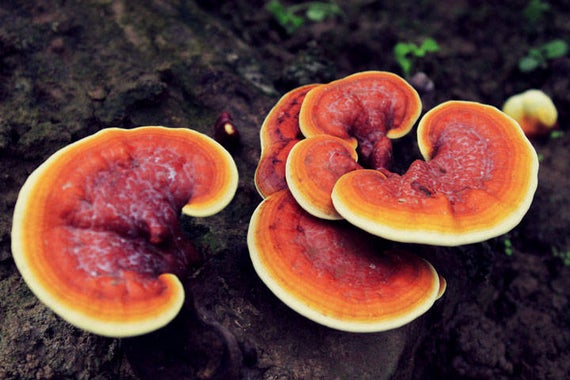Mushroom power: five therapeutic properties of medicinal mushrooms
Mushrooms have recently gained popularity in culinary circles, but their far-reaching therapeutic properties should get your attention for a longer and healthier life.
Although mushrooms have been part of the healer’s toolbox since ancient times, the medicinal power of mushrooms is gaining momentum in evidence-based journals.
 Medicinal mushrooms come in a wide variety and shapes such as white button, reishi, maitake, shiitake, oyster, cordyceps, cauliflower, tiger tail and lion’s mane, and most have health benefits that range from fighting cancer and boosting your immunity and memory to preventing diseases like diabetes and arthritis.
Medicinal mushrooms come in a wide variety and shapes such as white button, reishi, maitake, shiitake, oyster, cordyceps, cauliflower, tiger tail and lion’s mane, and most have health benefits that range from fighting cancer and boosting your immunity and memory to preventing diseases like diabetes and arthritis.
Five therapeutic properties of mushrooms
- Anticancer
Reishi (in Japanese) or lingzhi (in Chinese) mushrooms are well known in Asia for their anticancer properties. In a meta-analysis by scientists of 23 trials involving 4,246 cancer patients, reishi mushrooms enhanced longevity and quality of life in cancer patients.
Therapy with white button mushrooms impacted prostate-specific antigen (PSA) levels and inhibited prostate cancer by decreasing immunosuppressive factors.
Polysaccharides from Cordyceps cicadae mushrooms inhibited the growth of cancer cells and induced cancer cell deaths showing its effectiveness as a low cost and safe treatment for cervical cancer.
A peptide from the shiitake mushroom showed promising results in growth arrest, cell death and cleaning out damaged cells in a breast cancer in vitro study.
In both in vitro and in vivo studies, results showed that mice with induced testicular cancer treated with the Cordyceps sinensis mushroom had significantly smaller and fewer tumors than the control group.
Cordyceps cicadae mushroom treatment prevented testicular damage and tumors caused by the chemotherapy drug Cisplatin via inhibition of oxidative stress and inflammation in rats.
In a lung cancer-induced study of mice, treatment with reishi mushrooms inhibited cell viability and mobility of lung cancer cells in vitro.
In a cell study of reishi mushroom extract, the treatment offered high antitumor and liver protection with low toxicity on human liver cancer cells.
- Immunomodulatory
In a meta-analysis of 20 animal disease studies, grifola frondosa, or maitake mushroom, polysaccharide showed strong immune function by enhancing T cells, natural killer cells and macrophages in mice and increasing the secretion of two important immune factors, TNF-α and INF-γ.
In a clinical study of 105 cancer patients undergoing chemotherapy or radiation treatments, a combination of reishi mushroom extract and geraniums improved immunity and fought the cancer and secondary infections that could have compromised treatment and health.
In a study of 18 patients diagnosed with low and intermediate myelodysplastic syndrome, which can lead to leukemia if not managed well, maitake mushroom extract treatment of three milligrams (mg) twice a day for 12 weeks increased immunity, positively affecting neutrophil, monocyte and free radical production.
In a clinical study of asymptomatic children from 3 to 5 years old, treatment with beta glucans from reishi mushrooms showed increased immune system cells in the peripheral blood – signaling a strong defense against childhood infections.
Reviewing in vivo and in vitro studies on mice and human cell lines using lion’s mane (Hericium erinaceus) and tiger tail (Trametes versicolor) mushrooms, treatments showed immunomodulatory, anticancer, anti-inflammatory and neuroregenerative effects.
- Antioxidant
Polysaccharide beta glucan extracted from reishi mushroom was shown to be a powerful antioxidant in 37 high risk and 34 stable angina patients; those who were treated with 750 mg per day for three months had significantly decreased oxidative radicals and improved progression of atherosclerosis.
In a study of 42 healthy subjects, another intervention with beta glucan from reishi mushrooms of 225 mg per day for three months demonstrated its antioxidative effects – enhanced total antioxidant capacity and enzyme activities as well as reduced mild fatty liver condition to normal by suppressing oxidative stress were observed.

- Anti-inflammatory
Crohn’s disease is a chronic inflammatory disease of the gastrointestinal tract. Treatment with a triterpene compound from reishi mushrooms showed that the inflammatory cytokines were significantly inhibited in a study of children with Crohn’s disease.
Sixty patients with moderate persistent asthma were studied and those who took the cordyceps sinensis mushroom capsule for two months had reduced airway inflammation caused by their chronic asthma.
Cordycepin from medicinal mushrooms showed strong effects on many anti-inflammatory diseases. In a study of 32 patients with active rheumatoid arthritis, supplementation of medicinal mushroom and Chinese herbs – reishi (4 grams) and San Miao San (2.4 grams) daily – lowered arthritic pain for patients.
The data in a mice study support a model where white button mushrooms regulate immunity in vitro and protect the colon from inflammation-induced injuries in vivo.
The brain is susceptible to inflammation as well. In an Alzheimer’s disease model of rats, treatment with medicinal mushroom extracts delayed disease progression, improved learning and memory functions and stopped neural cell deaths and brain atrophy.
Chaga mushrooms administered to mice successfully protected against Alzheimer’s disease by modulating oxidative stress, Nrf2 signaling and mitochondrial cell deaths while improving memory and cognition.
Cordycepin from the Cordyceps sinensis mushroom alleviated Parkinson’s disease motor disorder symptoms by lowering oxidative stress and inflammation in vivo and in vitro.
Lion’s mane mushrooms were supplemented for 12 weeks and were effective in preventing dementia and cognitive decline.
Lion’s mane supplementation for four weeks in a study of 30 females also reduced depression and anxiety.
- Antidiabetic
Dyslipidemia, high blood cholesterol and triglycerides is often a harbinger of future diabetes. In a rat model, white button mushrooms and a probiotic were found to lower dyslipidemia and decrease oxidative stress.
In a study of 89 diabetic patients, oyster mushroom consumption significantly reduced blood glucose, blood pressure, triglycerides and cholesterol without ill effects on the liver or kidneys.
Polyphenols from Phellinus igniarius, or willow bracket, mushroom extract were used in vitro and in vivo studies of induced Type 2 diabetes mice and showed improved glucose tolerance, reduced hyperglycemia and normalized insulin levels.
Diabetic nephropathy, kidney disease caused by Type 2 diabetes, was studied in vitro with disease-induced rats and treatment with Cordyceps cicadae resulted in improved insulin resistance and glucose tolerance, suppressed inflammation and balanced gut microbiome thus stopping the diabetes-related progression of renal disease and tumors.
In an animal study, maitake mushroom prevented the progression of kidney fibrosis in diabetic nephropathy rats, significantly decreased fasting blood glucose levels, reduced inflammatory cytokines and lowered renal fibrosis indexes indicating its effectiveness in the treatment or prevention of nephropathy.
In their meta-analysis of 623 articles and 33 randomized controlled experiments using cauliflower mushroom extract (S. Crispa), researchers found statistically significant differences in diabetic symptoms including decreased serum insulin levels and wound rates and an increase in nutrient intake content.
Mushrooms and their medicinal powers
Medicinal mushrooms are widely researched and used as treatment in the prevention and progression of many diseases from cancer and asthma to diabetes and dementia. Mushrooms protect you due to their anti-inflammatory, antitumor, antidiabetic, immune boosting and antioxidant activities.
yogaesoteric
July 17, 2021
